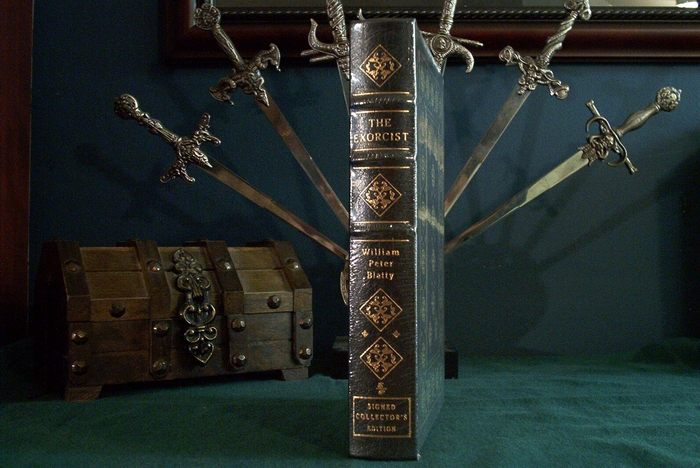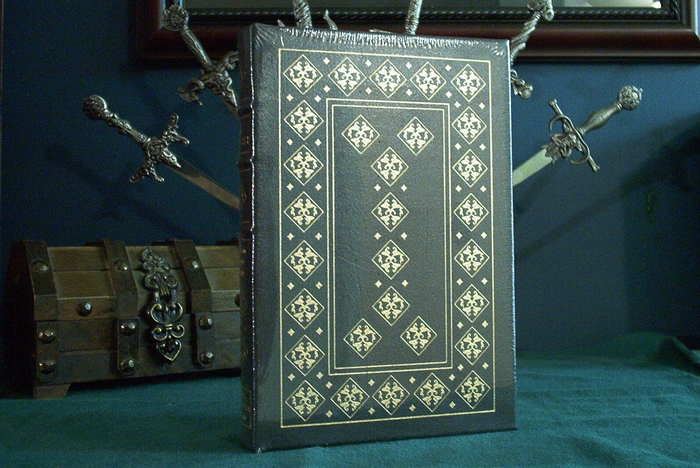Easton Press William Peter Blatty books
The Exorcist - signed edition - 2000
Author William Peter Blatty
William Peter Blatty, born on January 7, 1928, in New York City, was an American author and filmmaker best known for his iconic novel The Exorcist. Blatty's life and career spanned a diverse range of creative pursuits, from comedic writing to horror, earning him recognition and acclaim in both literature and cinema. Blatty's early years were marked by his education at the Jesuit high school Brooklyn Preparatory, which would later influence his writing. He attended Georgetown University, where he studied English literature and continued to deepen his Catholic faith. Following graduation, Blatty served in the United States Air Force Psychological Warfare Division, an experience that would later shape his perspectives on the supernatural.
Blatty initially found success as a comedic writer, with works like Which Way to Mecca, Jack? (1959) and John Goldfarb, Please Come Home! (1963). However, it was his foray into horror that catapulted him into literary stardom. In 1971, he published The Exorcist, a chilling tale of demonic possession that struck a chord with readers and became a cultural phenomenon. The novel's success was followed by the equally impactful film adaptation in 1973, for which Blatty wrote the screenplay. The Exorcist novel not only terrified readers but also explored themes of faith, doubt, and the battle between good and evil. Blatty's skill in blending horror with philosophical and religious elements set his work apart in the genre.
Beyond The Exorcist, Blatty continued to write novels, including Legion (1983), which served as the basis for The Exorcist III, a film he also directed. While he achieved notable success in the horror genre, Blatty's works often delved into deeper themes, reflecting his intellectual and philosophical interests.
The Ninth Configuration was originally published in 1978 under the title Twinkle, Twinkle, 'Killer' Kane! The novel was later reissued with the title The Ninth Configuration, which is also the title of the film adaptation written and directed by Blatty in 1980. The story is set in a remote castle that serves as a mental institution for military personnel suffering from psychiatric disorders. The central character is Colonel Vincent Kane, a marine psychiatrist, who arrives at the castle to take over the treatment of the patients. The novel explores themes of faith, sanity, and the nature of good and evil. Blatty's The Ninth Configuration delves into the psychological aspects of war and the toll it takes on individuals. The narrative is known for its blending of dark humor, philosophical discussions, and elements of the supernatural. The novel was well-received for its unique and thought-provoking approach to exploring the human psyche in the context of war.
In addition to his literary pursuits, Blatty contributed to the film industry, working as a screenwriter, producer, and director. His filmography includes projects such as The Ninth Configuration (1980), an exploration of mental illness and faith. William Peter Blatty passed away on January 12, 2017, leaving behind a legacy that transcends the horror genre. His impact on both literature and cinema is evident in the enduring popularity and cultural significance of "The Exorcist" and his other works. Blatty's ability to terrify and provoke thought continues to influence and captivate audiences, cementing his place as a master storyteller in the realms of horror and beyond.
The Exorcist
Georgetown,
Washington D.C. Actress and divorced mother Chris MacNeil starts to
experience 'difficulties' with her usually sweet-natured eleven-year-old
daughter Regan. The child becomes afflicted by spasms, convulsions and
unsettling amnesiac episodes; these abruptly worsen into violent fits of
appalling foul-mouthed curses, accompanied by physical mutation.
Medical science is baffled by Regan's plight and, in her increasing
despair, Chris turns to troubled priest and psychiatrist Damien Karras,
who immediately recognises something profoundly malevolent in Regan's
distorted fetures and speech. On Karras's recommendation, the Church
summons Father Merrin, a specialist in the exorcism of demons . . .


Comments
Post a Comment
Share your best book review and recommendation